|
Books Should Be Free Loyal Books Free Public Domain Audiobooks & eBook Downloads |
|
|
Books Should Be Free Loyal Books Free Public Domain Audiobooks & eBook Downloads |
|
Satires |
|---|
|
Book type:
Sort by:
View by:
|
By: Ambrose Bierce (1842-1914?) | |
|---|---|
 In the Midst of Life; Tales of Soldiers and Civilians
In the Midst of Life; Tales of Soldiers and Civilians
These stories detail the lives of soldiers and civilians during the American Civil War. This is the 1909 edition. The 1909 edition omits six stories from the original 1891 edition; these six stories are added to this recording (from an undated English edition). The 1891 edition is entitled In The Midst Of Life; Tales Of Soldiers And Civilians. The Wikipedia entry for the book uses the title Tales of Soldiers and Civilians. Ambrose Gwinnett Bierce (June 24, 1842 – after December 26, 1913) was an American editorialist, journalist, short story writer, fabulist and satirist... | |
 Cynic Looks At Life
Cynic Looks At Life
Civilization, Immortality, the Death Penalty, these are just a few of the essays enclosed in this collection, A Cynic Looks At Life. Written by Ambrose Bierce, these essays continue to be thought provoking, offering a valid outlook on life. | |
By: Bill Nye (1850-1896) | |
|---|---|
 Bill Nye's Funniest Thoughts
Bill Nye's Funniest Thoughts
Bill Nye was a famous American humor columnist in the middle 1800's. He said "We can never be a nation of snobs so long as we are willing to poke fun at ourselves." And he did exactly that in hundreds of newspaper columns that were later collected into books. This is a selection of just 35 of the most humorous, wry and downright funny cogitations of his, written of course in the somewhat convoluted style common in the 19th century which just adds to their flavor in my opinion. The selection process was rigorous: only those that made me laugh, giggle or snort are included. | |
By: Saki (1870-1916) | |
|---|---|
 The Chronicles of Clovis
The Chronicles of Clovis
This is the third collection of short stories by Saki, following on from “Reginald” and “Reginald in Russia”. Although some of the stories have characters that do not appear elsewhere in the collection, many of them are loosely centred round the young Clovis Sangrail (effectively a reincarnation of Reginald). | |
By: Edwin Abbott Abbott (1838-1926) | |
|---|---|
 Flatland: A Romance of Many Dimensions
Flatland: A Romance of Many Dimensions
If you've never heard the term “Mathematical Fiction” before, Edwin Abbott Abbott's 1884 novella, Flatland can certainly enlighten you! Flatland: A Romance of Many Dimensions was published in 1884 and since then, it has been discovered and re-discovered by succeeding generations who have been delighted by its unique view of society and people. The plot opens with a description of the fictional Flatland. The narrator calls himself “Square” and asks readers to “Imagine a vast sheet of paper on which straight Lines, Squares, Triangles, Pentagons, Hexagons and other figures, instead of remaining fixed in their places, move freely about... | |
By: John Kendrick Bangs (1862-1922) | |
|---|---|
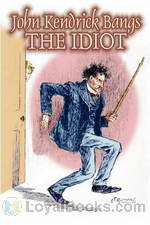 The Idiot
The Idiot
The Idiot is anything but, yet his fellow boarders at Mrs. Smithers-Pedagog’s home for single gentlemen see him as such. His brand of creative thought is dismissed as foolishness yet it continues to get under their skin, because when you’re beneath contempt you can say what you please. – This is the first of John Kendrick Bangs' “Idiot” books and was published by Harper and Brothers in 1895. | |
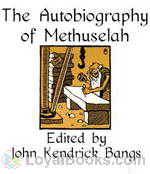 The Autobiography of Methuselah
The Autobiography of Methuselah
A satirical look at early biblical events from the point of view of someone who was there to witness most of them: the oldest man in recorded history. | |
By: George Barr McCutcheon (1866-1928) | |
|---|---|
 Yollop
Yollop
Mr. Crittenden Yollop makes friends with the man who came to burglarize his home and sets out to help him return to where he really wants to be...prison. This humorous satire takes a somewhat different look at prisons, criminals, the law and reformers. | |
By: Aldous Huxley (1894-1963) | |
|---|---|
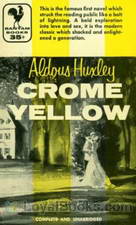 Crome Yellow
Crome Yellow
A shy, introverted young poet. A weekend in a magnificent English country house. A beautiful young lady whom the poet is secretly in love with. An assorted group of guests with varied interests, motives, ambitions and aspirations, and the complex web of history and events that connect all of them. Crome Yellow by Aldous Huxley was his first book, published in 1921, when he was just 27 years old. It is typical of many books written during this period by writers like Thomas Love Peacock and Somerset Maugham, centered round a country mansion and the quaint, British tradition of being invited to spend a weekend with a group of people whom one may or may not know... | |
By: Anton Chekhov (1860-1904) | |
|---|---|
 The Cherry Orchard
The Cherry Orchard
The Cherry Orchard is Russian playwright Anton Chekhov's last play. It premiered at the Moscow Art Theatre 17 January 1904 in a production directed by Constantin Stanislavski. Chekhov intended this play as a comedy and it does contain some elements of farce; however, Stanislavski insisted on directing the play as a tragedy. Since this initial production, directors have had to contend with the dual nature of this play. The play concerns an aristocratic Russian woman and her family as they return to the family's estate (which includes a large and well-known cherry orchard) just before it is auctioned to pay the mortgage... | |
By: Robert Smythe Hichens (1864-1950) | |
|---|---|
 Green Carnation
Green Carnation
The Green Carnation, first published anonymously in 1894, was a scandalous novel by Robert Hichens whose lead characters are closely based on Oscar Wilde and Lord Alfred Douglas - also known as 'Bosie', whom the author personally knew. It was an instant succès de scandale on both sides of the Atlantic. The book features the characters of 'Esmé Amarinth' (Wilde), and 'Lord Reginald (Reggie) Hastings' (Douglas). The words put in the mouths of the hero and his young friend in the story are mostly gathered from the sayings of their originals... | |
By: H. G. Wells (1866-1946) | |
|---|---|
 Love and Mr Lewisham
Love and Mr Lewisham
The teaching profession, science and politics in late 19th century England. H.G.Wells’ humorous early novel, drawing on his own life, shows how these – as well as involvement in spiritualism – have to compete with love. | |
By: George Bernard Shaw (1856-1950) | |
|---|---|
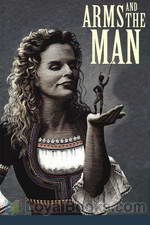 Arms and the Man
Arms and the Man
Arms and the Man is a comedy by George Bernard Shaw that takes place in 1885, during the Serbo-Bulgarian War. Raina Petkoff is engaged to the gallant Sergius Saranoff, hero of the recent Bulgarian victory over the Serbs. But she is distracted by the abrupt arrival of Captain Bluntschli, a Swiss mercenary who fought for the Serbian army. He takes refuge in her bedroom after the battle and although he is initially threatening, reveals that he carries chocolates instead of bullets. Will Raina marry the posturing Sergius or the chocolate cream soldier? Extra intrigue is provided by saucy servant girl Louka, her dour fiance Nicola, and Raina's hand-wringing parents. | |
 Mrs. Warren's Profession
Mrs. Warren's Profession
The story centers on the relationship between Mrs Kitty Warren, a rich woman, described by the author as "on the whole, a genial and fairly presentable old blackguard of a woman" and her daughter, Vivie. Mrs Warren is a middle-aged woman whose Cambridge-educated daughter, Vivie, is horrified to discover the morally questionable way her mother acquired her fortune. | |
By: Edwin F. Benson (1867-1940) | |
|---|---|
 Miss Mapp
Miss Mapp
E. F. Benson’s Mapp and Lucia series, consists of six novels and three short stories. The novels are: Queen Lucia, Lucia in London, Miss Mapp (including the short story The Male Impersonator), Mapp and Lucia, Lucia’s Progress (published as The Worshipful Lucia in the U.S.) and Trouble for Lucia. Most of these works are set in the fictional village of “Tilling”, which is based on the village of Rye, Sussex, England. “Mallards”, the house with the garden room inhabited by Miss Mapp, and later by Lucia, is based on Lamb House, Benson’s own home in Rye. Earlier, the house was the Sussex home of writer Henry James. | |
By: Henry Fielding (1707-1754) | |
|---|---|
 Journey from this World to the Next
Journey from this World to the Next
The narrator dies in the first sentence. Through relating his travels in the afterlife, Henry Fielding, author of Tom Jones and Joseph Andrews, gently satirizes life here on earth. | |
 The History of the Life of the Late Mr. Jonathan Wild the Great
The History of the Life of the Late Mr. Jonathan Wild the Great
This novel is sometimes thought of as [Fielding's] first because he almost certainly began composing it before he wrote Shamela and Joseph Andrews. It is a satire of Walpole that draws a parallel between Walpole and Jonathan Wild, the infamous gang leader and highwayman. He implicitly compares the Whig party in Parliament with a gang of thieves being run by Walpole, whose constant desire to be a “Great Man” (a common epithet for Walpole) should culminate only in the antithesis of greatness: being hanged. | |
 An Apology for the Life of Mrs. Shamela Andrews
An Apology for the Life of Mrs. Shamela Andrews
An Apology for the Life of Mrs. Shamela Andrews, or simply Shamela, as it is more commonly known, is a satirical novel written by Henry Fielding and first published in April 1741 under the name of Mr. Conny Keyber. Fielding never owned to writing the work, but it is widely considered to be his. It is a direct attack on the then-popular novel Pamela (November 1740) by Fielding's contemporary and rival Samuel Richardson and is composed, like Pamela, in epistolary form. Shamela is written as a shocking revelation of the true events which took place in the life of Pamela Andrews, the main heroine of Pamela... | |
By: Henry L. Mencken | |
|---|---|
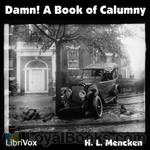 Damn! A Book of Calumny
Damn! A Book of Calumny
Henry Louis “H. L.” Mencken (1880 – 1956) was an American journalist, essayist, magazine editor, satirist, acerbic critic of American life and culture, and a student of American English. Known as the “Sage of Baltimore”, he is regarded as one of the most influential American writers and prose stylists of the first half of the 20th century. Mencken is perhaps best remembered today for The American Language, a multi-volume study of how the English language is spoken in the United States, and for his satirical reporting on the Scopes trial, which he named the “Monkey” trial.” | |
By: Irvin S. Cobb (1876-1944) | |
|---|---|
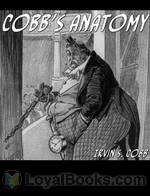 Cobb's Anatomy
Cobb's Anatomy
Irvin Shrewsbury Cobb was born on June 23, 1876. At seventeen years of age, he began writing for the Paducah Daily News, his hometown paper. At nineteen he became the managing editor; up to that point, our nation’s youngest. He worked as a columnist, a humorist and an author. But ‘horror,’ and ’short stories,’ are not why he is remembered. He is remembered because he was, and still is, funny. And although he is now dead–he died March 11, 1944–this work “Cobb’s Anatomy,” among others, has left an indelible mark upon mankind: a smile. | |
By: Samuel Butler (1835-1902) | |
|---|---|
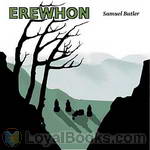 Erewhon
Erewhon
Erewhon, or Over the Range is a novel by Samuel Butler, published anonymously in 1872. The title is also the name of a country, supposedly discovered by the protagonist. In the novel, it is not revealed in which part of the world Erewhon is, but it is clear that it is a fictional country. Butler meant the title to be read as the word Nowhere backwards, even though the letters “h” and “w” are transposed. It is likely that he did this to protect himself from accusations of being unpatriotic, although Erewhon is obviously a satire of Victorian society. | |
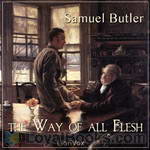 The Way of All Flesh
The Way of All Flesh
The Way of All Flesh (1903) is a semi-autobiographical novel by Samuel Butler which attacks Victorian-era hypocrisy. Written between 1873 and 1884, it traces four generations of the Pontifex family. It represents the diminishment of religious outlook from a Calvinistic approach, which is presented as harsh. Butler dared not publish it during his lifetime, but when it was published it was accepted as part of the general revulsion against Victorianism. | |
By: Nikolai Vasilievich Gogol | |
|---|---|
 Dead Souls
Dead Souls
Dead Souls by Nikolai Gogol, Russian writer, was first published in 1842, and is one of the most prominent works of 19th-century Russian literature. Gogol himself saw it as an “epic poem in prose”, and within the book as a “novel in verse”. Despite supposedly completing the trilogy’s second part, Gogol destroyed it shortly before his death. Although the novel ends in mid-sentence (like Sterne’s Sentimental Journey), it is usually regarded as complete in the extant form. In Russia before the emancipation of the serfs in 1861, landowners were entitled to own serfs to farm their land... | |
By: Thomas Carlyle (1795-1881) | |
|---|---|
 Sartor Resartus: the life and opinions of Herr Teufelsdröckh
Sartor Resartus: the life and opinions of Herr Teufelsdröckh
| |
 Sartor Resartus, and On Heroes, Hero-Worship, and the Heroic in History
Sartor Resartus, and On Heroes, Hero-Worship, and the Heroic in History
| |
By: C. J. Dennis (1876-1938) | |
|---|---|
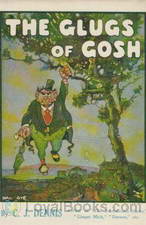 The Glugs of Gosh
The Glugs of Gosh
First published in 1917, The Glugs of Gosh satirizes Australian life at the start of the twentieth century – but the absurdities it catalogs seem just as prevalent at the start of the twenty-first. The foolishness of kings, the arrogance of the elite, the gullibility of crowds, the pride of the self-righteous, the unthinking following of tradition – all find themselves the targets of C. J. Dennis’ biting wit. | |
By: Samuel Johnson (1709-1784) | |
|---|---|
 Rasselas, Prince of Abyssinia
Rasselas, Prince of Abyssinia
In this enchanting fable (subtitled The Choice of Life), Rasselas and his retinue burrow their way out of the totalitarian paradise of the Happy Valley in search of that triad of eighteenth-century aspiration – life, liberty and happiness.According to that quirky authority, James Boswell, Johnson penned his only work of prose fiction in a handful of days to cover the cost of his mother’s funeral. The stylistic elegance of the book and its wide-ranging philosophical concerns give no hint of haste or superficiality... | |
By: George Bernard Shaw | |
|---|---|
 Candida
Candida
Candida, a comedy by playwright George Bernard Shaw, was first published in 1898, as part of his Plays Pleasant. The central characters are clergyman James Morell, his wife Candida and a youthful poet, Eugene Marchbanks, who tries to win Candida's affections. The play questions Victorian notions of love and marriage, asking what a woman really desires from her husband. The cleric is a Fabian Socialist, allowing Shaw—himself a Fabian—to weave political issues, current at the time, into the story. | |
By: Tobias Smollett | |
|---|---|
 The Expedition of Humphry Clinker
The Expedition of Humphry Clinker
The Expedition of Humphry Clinker was the last of the picaresque novels of Tobias Smollett, and is considered by many to be his best and funniest work. Published in London on 17 June 1771, it is an epistolary novel, presented in the form of letters written by six different characters: Matthew Bramble, a Welsh Squire; his sister Tabitha; their niece and nephew, Jery and Lydia Melford; Tabitha’s maid Winifred Jenkins; and Lydia’s suitor, Wilson. Much of the comedy arises from differences in the descriptions of the same events by different participants... | |
By: Ward Moore (1903-1978) | |
|---|---|
 Greener Than You Think
Greener Than You Think
Do remember reading a panic-mongering news story a while back about genetically engineered “Frankengrass” “escaping” from the golf course where it had been planted? That news story was foreshadowed decades previously in the form of prophetic fiction wherein a pushy salesman, a cash-strapped scientist, and a clump of crabgrass accidentally merge forces with apocalyptic consequences. A triple-genre combo of science fiction, horror, and satire, Greener Than You Think is a forgotten classic that resonates beautifully with modern times. This is a faithful reading of a 1947 first edition text. | |
By: Desiderius Erasmus (1466/69-1536) | |
|---|---|
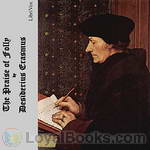 The Praise of Folly
The Praise of Folly
The Praise of Folly (Greek title: Morias Enkomion (Μωρίας Εγκώμιον), Latin: Stultitiae Laus, sometimes translated as In Praise of Folly, Dutch title: Lof der Zotheid) is a satirical essay written in 1509 by Desiderius Erasmus of Rotterdam (1466/69-1536). It is considered one of the most influential works of literature in Western civilization and one of the catalysts of the Protestant Reformation.It starts off with a satirical learned encomium after the manner of the Greek satirist... | |
By: Anton Chekhov (1860-1904) | |
|---|---|
 Ward No. 6
Ward No. 6
The line between sanity and insanity is blurred in this classic novella by Anton Chekhov. The disillusioned idealist Dr. Rabin is in charge of a provincial lunatic asylum, overseeing with weary, dubious policies a motley group of patients, a group that mirrors in microcosm all of human and especially Russian society. Seeking answers to profound questions, Dr. Rabin enters into dialogues with both staff members and patients, trying to make sense out of what has become of his life, until it becomes less and less clear who is the doctor and who is the patient... | |